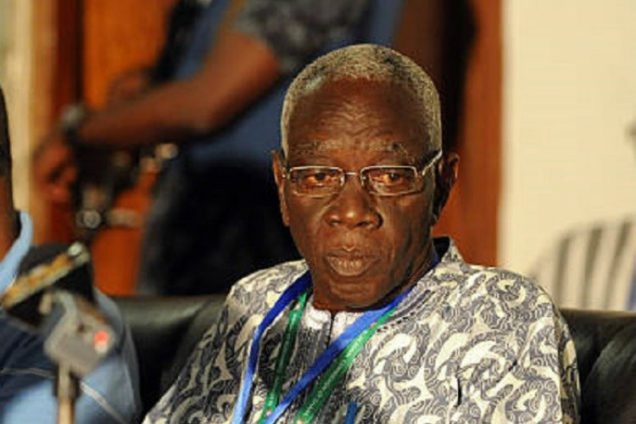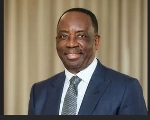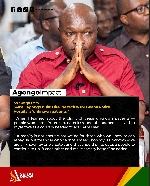Afari-Gyan reacts to NDC’s proposed electoral reforms
 Former EC Chair Dr Kwadwo Afari-Gyan
Former EC Chair Dr Kwadwo Afari-Gyan
I wish to make comments on the NDC’s proposals for electoral reforms currently in circulation.
The proposals are in two parts, A and B. I do not comment on matters contained in Part B of the proposals, not because I consider them to be unimportant but because for the most part, they relate to administrative issues that I think the Electoral Commission (EC) and the Inter-Party Advisory Committee (IPAC) can conveniently deal with. On the other hand, the EC itself cannot deal with the proposals in part A: they require actions by higher authorities.
My justification for commenting on the proposals is on two grounds. First, the discussion of electoral reforms should not be the exclusive preserve of the political parties and the EC. The electoral process belongs to the people of Ghana, so it is proper for individuals and groups, particularly election-related civil society organisations, that so wish, to contribute to the discussion.
The second ground is to be found in three of the four-point conclusions in part A of the proposals. I have adapted them into two points as follows, hopefully without loss of essential meaning:
1. Please feel free to add to or subtract from our proposals and to suggest the best ways in which we can get them to see the light of day.
2 We have made these proposals because we believe they are in the best interest of the country.
Against the foregoing backdrop, I will take the 10 proposals in part A one by one and comment on them. I make my comments with no pretensions at all that what I say is exclusively right. The converse should hold: no person or body should presume that their views are right to the exclusion of other views. The essence of a discussion is to exchange views until the factions can reach a consensus or disagree on reasonable grounds. I state each proposal in the exact form I have it.
Prior parliamentary approval of EC members
Comment: There are different ways of composing the membership of election bodies around the world, and, indeed, several countries require parliamentary approval of the members. Currently, the President appoints the members of the EC on the advice of the Council of State. With regard to this proposal, it is important to specify the route to parliamentary approval. Who will make the recommendation to parliament? What role, if any, will the Council of State play? Specifying the route to parliamentary approval will make it clearer to see whether this proposal constitutes an improvement on the current practice.
Electoral offences
I find this proposal to be in order. It does not make much sense to me to give a right to a person or body and then insist that the right can be enjoyed or exercised at the discretion of some other person or body.
Specially designated courts
Comment: Undue delay in resolving electoral disputes is always a problem, and some countries have tried to expedite action by setting up specialised courts to deal with election-related cases. For me, two issues arise in connection with this proposal. The first has to do with access: who can take what case to the election court? The answer may affect the number of such courts and where they are situated. The second is whether the decisions of the courts could be appealed: if so, to which court/s and how can we be sure that the judges there will be knowledgeable about electoral matters.
We may also consider the use of a technicality, such as a lawyer sending to the court a writ, instead of a petition, to throw out an otherwise genuine election case. In such a situation, the lawyer could be made to pay a fine for the substantive case to be heard.
Remove names
Comment: I understand this to be additional to the current facility whereby a registered voter can object to the inclusion or exclusion of a name in the provisional register. It is to be hoped that utmost care will be taken in identifying the relevant “authorities” and “sources” for the removal of names from the register, so as not to leave room for, say, fake deaths. A name duly placed in the register is like a sacred cow.
Equal access to all political parties
Comment: Once the Supreme Court has spoken, the GBC must obey. I think what is needed is a clear understanding of what the Supreme Court actually said. Then, whenever the GBC defaults, it is up to the aggrieved party to take the GBC to court. Otherwise, who should make the GBC to comply?
IPAC should be backed by legislation
Comment: The background of the proposal is stated as follows: “IPAC has served Ghana’s electoral system well, but because it is informal, the EC tends to ignore some of its concerns or even to marginalise it”. I find the proposal to be problematic on three grounds, taken together.
1. There are, indeed, big political parties and small political parties in Ghana, just as there are big and small nations in the UN. But a registered political party, big or small, cannot be excluded from the deliberations of IPAC.
2. IPAC was created as an informal, consensus-building mechanism, where no voting is done. It will be difficult to find any other satisfactory mode of decision-taking, given the number of commissioners vis-à-vis the number of political parties.
3. The Constitution clearly says that, in doing its work, the EC should not take instructions from any person or body external to the Commission. IPAC is such a body. Accordingly, IPAC decisions cannot be binding on the EC.
If they were, it would, in effect, amount to no less than meddling with the independence of the Commission. Barring a constitutional change, through a referendum, of this entrenched provision, the relationship between IPAC and the Commission cannot be changed through an amendment to or the enactment of an Act.
In the circumstances, an IPAC decision amounts to a recommendation, which the EC may accept or reject on reasonable grounds, after careful consideration. To give an example, at one time the political parties wanted it made mandatory for a person to produce his/her Voter ID Card before being allowed to vote. The EC said no, because the card does not create a right; its essence is to facilitate the identification of a prospective voter: the legal requirement for voting is having one’s name in the voters register. The EC held that, in the absence of the card, the onus falls on the prospective voter to satisfactorily identify himself/herself.
When political parties take a stance that is not in the interest of the voter, it is the duty of the EC to protect the interest of the voter.
In sum, the EC does not have to do something simply because most, even all, the political parties want it done.
The converse also holds: the EC should not refuse to do something simply because most of the parties don’t want it done. On the other hand, since the political parties are the most immediate and frequent users of the electoral process, it is prudent for the EC to act on their demands, provided they enhance transparency, are lawful, practical, cost-effective, and satisfy the standards of electoral justice.
Security responsibilities of EC
Comment: Regarding this proposal, it is important to bear in mind that the norm in a democracy is that the police have primary responsibility for election security. The reason is that civilians are usually not comfortable, can even be scared, to see soldiers at registration centres and polling stations. From my experience, it is only in an election following a civil war that the presence of soldiers may be deemed to be necessary to assure the people that election-related activities will not be invaded by illegitimate militias.
Political parties and candidates’ full participation in collation of the Presidential Election results.
Comment: Worldwide, there are good (some will say best) practices that are used to enhance transparency and verifiability in collating election results.
They include:
1. Collation is done in the presence of the candidates or their duly appointed agents.
2. The place and time of collation is known well ahead of time.
3. The procedures for doing the collation are clearly outlined and known to all concerned.
4. The returning officer uses the appropriate basic documents to do the collation.
5. Copies of the collated results are given to the candidates/agents at the end of the collation.
In my view, it is vital that the EC’s National Collation Centre uses the collated results from the two hundred and seventy-five (275) constituency centres as the essential documents for collating the results of the presidential election. Otherwise, the accuracy or authenticity of any collation done beyond the constituency level cannot be promptly verified.
EC must, by law, be made:
1. a mandatory party to all parliamentary election petitions just as is the case in Presidential Election petitions.
2. a compellable witness to produce all public election and related materials and documents relevant to presidential and parliamentary disputes.
Comment: In my view, what this proposal seeks to do is to make explicit what has, perhaps, been presumed in the past to be implicit. I think that what it seeks to achieve, being a mandatory party and having to produce materials and documents needed to resolve an election dispute, can simply be placed as obligations on every returning officer.
It must be said that mistakes can, and do, occur in collating election results. But genuine misstates can be readily discovered and corrected. Not so deliberate wrongdoing by officials who lack ethical competence, that is, a predisposition not to do what one knows to be wrong in one’s line of duty. When unearthed, a deliberate wrongdoing by an election or party official must be severely punished, because it is tantamount to an attempt to undermine the will of the people, which is at the heart of a democratic election.
Split the EC
Comment: If this proposal is accepted, it will not be the first time that an erstwhile major responsibility was taken away from the EC. Until the National Identification Authority was established by law, the issue of national identification was the responsibility of the EC. I will not be surprised if the EC were to jump at the proposal.
Be that as it may, what would need to be done is to clearly define the relationship, if any, between the two bodies, mindful that the decisions of the ORPP cannot be binding on the EC. In the meantime, the EC might consider setting up a department, headed by a director, to focus on issues relating to political parties.
I wish to conclude with two thoughts. First, discussions on electoral reforms are so important that they require sober reflection in a spirit of give and take, not partisan posturing. It is to be hoped that IPAC will bring such ambience to bear on its deliberations. Secondly, in the search for transparency, accountability, and verifiability in our electoral processes, utmost care should be taken not to overload the EC with tasks that, with efficient organisation, the political parties could easily do on their own.
Source: Dr Kwadwo Afari-Gyan
Trending News

KGL records major milestones in 2025, defies critics with strong national and global impact
17:16
Okudzeto-Ablakwa inaugurates smart classrooms to boost STEM education in North Tongu
11:38
CDM accuses GoldBod CEO of contradictions over Gold-for-Reserves losses
16:40
Activist Felicity Nelson brings Christmas comfort to Accra Police cells
08:32
CDM rejects claims that BoG losses were due to Gold Purchase Programme
16:35
First batch of large-scale mining licences to face possible revocation revealed
09:08
CDM calls on President Mahama to act over ‘alarming’ GoldBod trading losses
16:30
A/R: Kumawu MP celebrates Christmas with drivers and Okada riders
07:57
Alhaji Agongo builds lifeline facility for Ghana Police Hospital’s ‘unknown patients’
13:42
IGP Special Operations Team arrests suspect in Kpalsi over suspected Indian Hemp
07:48



